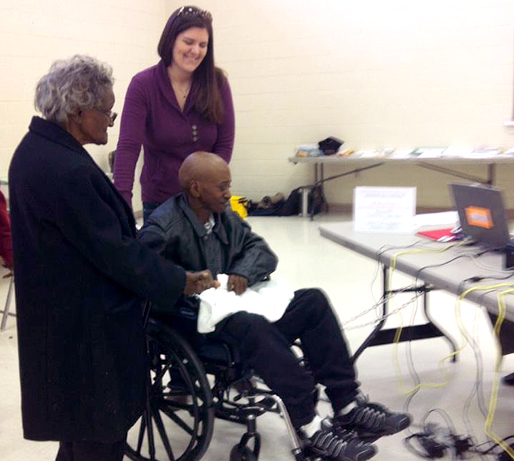An Innocence Project Clinic client who recently was exonerated of rape cast his vote for the first time today thanks to the efforts of supporters at the University of Virginia School of Law, including a student who helped take the man to the polls this morning.
“He just kept repeating, ‘You don’t know what this means to me, you don’t know what this means to me,” said second-year law student Alexandra Meador, who helped organize an effort to ensure the man, Bennett Barbour, would be able to vote.
Barbour, a Charles City man who was convicted of rape in 1978, was excluded from his alleged crime by DNA evidence and the state granted him a writ of innocence in May with help from the clinic. Days ago, as the Richmond Times-Dispatch reported, Barbour discovered he was not eligible to vote despite registering, due to his less-serious felony convictions. But on Friday, Gov. Robert F. McDonnell offered to restore Barbour’s voting rights if he paid $1,075.07 in court fees he owed to the Henrico County Circuit Court that were unrelated to the overturned conviction.
“Of course, Mr. Barbour is indigent, and is battling cancer,” said Deirdre Enright, director of investigation for the Innocence Project Clinic. “He thanked the governor for his efforts, but he couldn’t come up with that amount of money by Tuesday.”
Meador, a participant in the clinic and a board member of the Virginia Innocence Project Student Group, heard about the problem Friday afternoon. Though she was unsure whether they could clear up the issue with the court and state officials in time, Meador started a fundraising drive on Facebook that night.
“When we discovered that restoration of Mr. Barbour’s right to vote hinged on him paying off court fees, there was no question in my mind that we could and should raise the funds,” Meador said.
Virginia is one of four states that revoke the voting rights of felons and ex-felons absent an action by the governor.
“I hope that people who take their right to vote for granted look to Mr. Barbour for inspiration,” Meador said. “Voting is more than just expressing your preference for a particular candidate or a particular issue. It’s one of the fundamental ways we engage as active members of society.”
Barbour, whom Meador met last winter while volunteering for the clinic, is gravely ill.
“He said that he wanted to vote for the first – and in all likelihood, last – time in this Tuesday’s election,” Meador said. “He thought it was his duty to vote, and he’s been prevented from doing that for 34 years. I knew if I could be some part of making that happen, it would be a privilege and a blessing.”
About 40 people, including many U.Va. law students, gave to the effort through a Paypal account, with individual donations ranging from a few dollars to $500.
“By midday Saturday, we had the full amount,” Meador said.
When Meador announced the goal had been met, she offered to send any extra donations directly to Barbour. The Facebook page raised nearly $1,000 more before Meador ended the drive Sunday night.
Meador, who has 500 Facebook friends, said she was surprised at how viral the online effort became.
“The response that we got was simply incredible,” she said. “I don’t know the majority of people who donated. That was really cool to see – we had donations coming in from California, Florida, Texas, Ohio and New Jersey.”
Meador also thanked Enright for her help in managing the Facebook page. “I was in touch with her throughout the process,” she said.
Enright said that Lisa Inlow, one of the private investigators who works with the Virginia Innocence Project Student Group, actually paid the fine and took the receipt to the secretary of the commonwealth on Monday.
Meador and Inlow drove Barbour to the polls today to cast his vote as friends and family watched. Barbour’s mother and two sisters also accompanied him, and many area residents recognized and congratulated Barbour at the polls, where the mood was “celebratory,” Meador said.
“People were so congratulatory, everyone was rooting him on and congratulating him and shaking his hand. Everyone was really happy for him,” Meador said. “He thanked me and he thanked everyone who donated.”
Meador also gave him the extra money the effort raised.
“We didn’t tell him about the [additional] donations until after he voted,” she said. “He said, ‘Thank you so, so much, I love you all.’ He said he was going to be donating some of the money to his church because without God he was nothing.”
Meador said she was “amazed and inspired” by Barbour’s determination to vote.
“It was like a miracle that he was able to get out there. His health condition has deteriorated. He was so determined to go, but it was a struggle,” she said. “I was so glad that I got to be there to witness that. It was probably one of the best experiences of my life, being able to see him vote.”
Meador described the experience as she was driving back to Charlottesville. Charles City is about 100 miles away.
“My priority was getting Mr. Barbour to the polls and now I’m on my way back to Charlottesville to go vote myself.”
Media Contact
Article Information
November 6, 2012
/content/law-student-leads-drive-allow-innocence-clinic-client-vote-first-time

